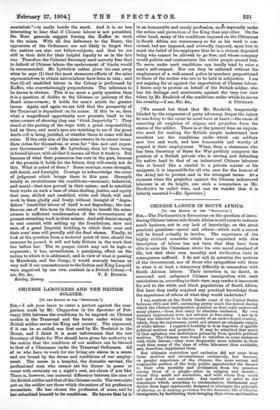CHINESE LABOURERS AND THE BRITISH SOLDIER.
[To THE EDITOR OF TILE "SPECTATOR."]
Sin,—I ask your leave to enter a protest against the com- parison made by Mr. Clapperton in the Spectator of Feb- ruary 20th between the conditions to be imposed on Chinese coolies in the Transvaal and the terms under which the British soldier serves his King and country. The argument, if it can be so called, was first used by Mr. Brodrick in the House, and I think it is most unfortunate that the late Secretary of State for War should have given his authority to the notion that the condition of our soldiers can be likened to that of a Chinaman under the Transvaal Ordinance. All of us who have to work for our living are slaves in a sense, and are bound by the terms and conditions of our employ- ment. The nurse in a hospital, the domestic servant, the professional man who cannot eat his dinner in peace or count with certainty on a night's rest, are slaves if you like. There is, however, one material difference between the case of the British soldier and that of the Chinese coolie. The restraints put on the soldier are those which the nature of his profession necessitate. He has chosen the profession of arms, and he has submitted himself to its conditions. He knows that he is in an honourable and manly profession, more especially under the notice and protection of his King than any other. On the other hand, many of the conditions imposed on the Chinaman in South Africa are unnecessary so far as his work is con- cerned, but are imposed, and avowedly imposed, upon him to mark the belief of his employers that he is a vicious, degraded being who cannot be allowed to go free, and whose company would pollute and contaminate the white people around him. To serve under such conditions can hardly tend to raise a man's self-respect. Nor can they be enforced without the employment of a well-armed police in numbers proportioned to those of the coolies who are to be held in subjection. I am not arguing for or against the importation of Chinese labour. I desire only to protest on behalf of the British soldier, who has his feelings and sentiments, against the very low view taken by Mr. Brodrick of the conditions under which he serves [We cannot but think that Mr. Brodrick, temporarily blinded by the exigencies of party advocacy, forgot the injury he was doing to the cause he must have at heart,—the cause of removing all suspicion of stigma and prejudice from the status of the soldier. There is at the present time an impera- tive need for making the British people understand how excellent are the conditions under which our soldiers now live and work, and how honourable and worthy of respect is their employment. When, then, a statesman who has been Secretary of State for War publicly compares the position of a British private who is serving and defending his native land to that of an indentured Chinese labourer who is bound like a chattel to a private master or his assignees, it is impossible for all who care for the honour of the Army not to protest, and in the strongest terms. At a moment when the prejudice against the Chinese indentured labourer is at its height, can such a comparison as Mr. Brodrick's be called wise, and can we wonder that it is bitterly resented P—En. Spectator.]










































 Previous page
Previous page